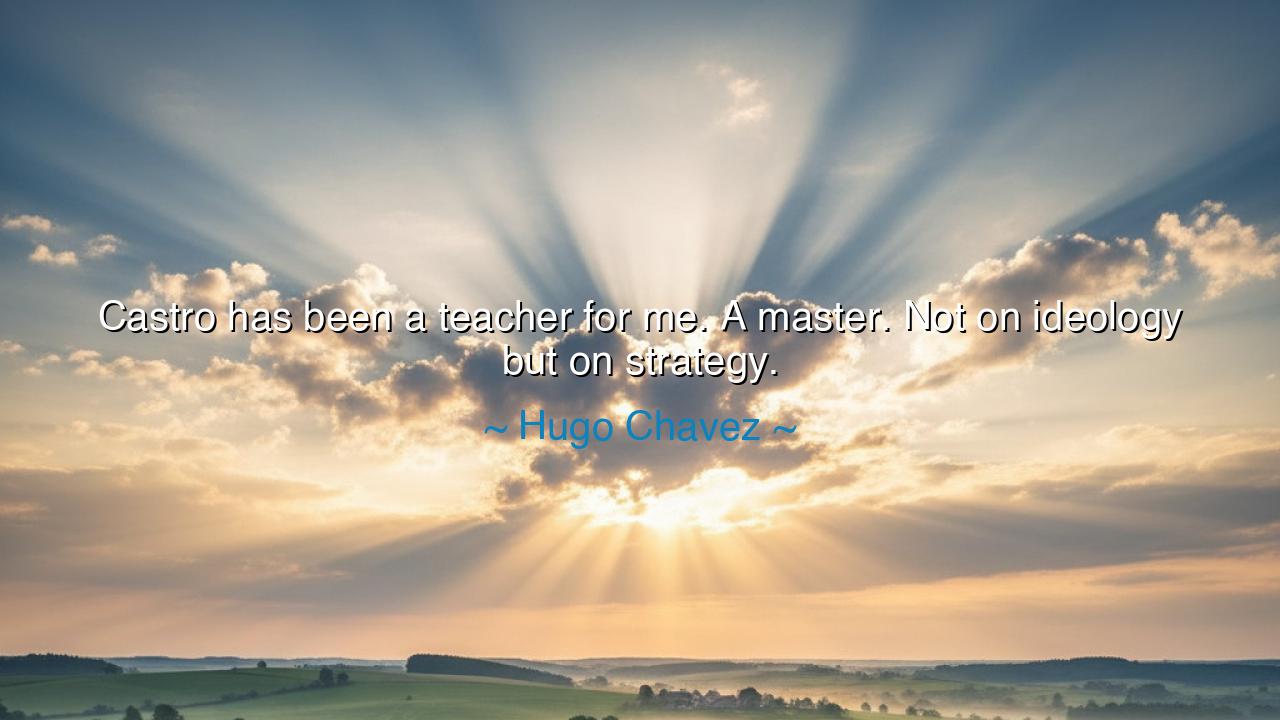
Castro has been a teacher for me. A master. Not on ideology but






Hugo Chávez once declared with fervor: “Castro has been a teacher for me. A master. Not on ideology but on strategy.” These words, spoken from the heart of one leader to another, reveal the hidden bond between the seeker of power and the wielder of it. For in the realm of nations, it is not enough to possess belief; one must also possess the art of strategy. Ideals without craft are like wings without air, but strategy turns vision into movement, and dreams into enduring reality.
When Chávez called Castro a teacher, he acknowledged that wisdom is not always found in books, nor in doctrines, but in the living experience of those who have walked through fire and endured. To call him a master was to confess that there are levels of knowledge—those who merely think, and those who act; those who hope, and those who prevail. In this, Chávez shows us that learning is not only the absorption of ideas but the apprenticeship of will, endurance, and cunning.
Consider the story of Fidel Castro himself, who, with a handful of men, faced the might of regimes and empires. He did not triumph by ideology alone, though his beliefs were fierce. He triumphed by strategy: by patience in the mountains, by striking where the enemy was weakest, by inspiring devotion in the hearts of the weary and oppressed. His victories were not inevitable—they were carved through discipline, foresight, and relentless adaptation. To watch such a man was to study a living textbook of power.
And history is filled with such examples. Alexander the Great sat at the feet of Aristotle for ideology, but in the fields of war he learned strategy from his father, Philip of Macedon. It was not philosophy alone that built an empire stretching from Greece to India, but the combination of vision and tactics, dream and design. Thus the ancients remind us: a leader without strategy is as a ship without a rudder, tossed aimlessly upon the seas.
Yet Chávez’s words hold another lesson. By saying, “Not on ideology but on strategy,” he reminds us that even those who differ in thought may learn from one another. You may reject another’s creed, but still glean from their discipline. You may disagree with their beliefs, but still admire their resilience. This is wisdom: to take what is useful without surrendering what is essential to your soul. Too many reject wisdom because they despise the source. The wise do not. They know that knowledge can be drawn even from an enemy’s strength.
The meaning, then, is this: seek always a teacher, and when you find a master, learn from him not only what he says but what he does. Do not worship blindly, nor follow without thought, but observe with keen eyes. Extract the strategy, the methods, the art of survival and triumph. For ideas inspire, but strategy sustains. Ideals may set the course, but only tactics will keep the vessel afloat when storms arise.
And what action shall you take, O listener? Look around you—not only to those you admire but also to those you fear. Ask: “What can I learn from their ways? What hidden strategy has carried them to endurance?” Read the lives of the great, not only for their words but for the structures of their deeds. Practice discernment, taking the honey but leaving the sting. For in this way, you will craft your own path—anchored in your beliefs, yet sharpened by the wisdom of others.
So let this teaching be engraved upon your heart: ideology without strategy is a flame without fuel. To truly rise, you must learn as Chávez learned, drawing strength from the teachers of the world, even those whose banners you do not raise. For in the end, the greatest victory belongs not to those who merely dream, but to those who dream with a plan.






AAdministratorAdministrator
Welcome, honored guests. Please leave a comment, we will respond soon